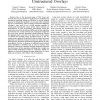Free Online Productivity Tools
i2Speak
i2Symbol
i2OCR
iTex2Img
iWeb2Print
iWeb2Shot
i2Type
iPdf2Split
iPdf2Merge
i2Bopomofo
i2Arabic
i2Style
i2Image
i2PDF
iLatex2Rtf
Sci2ools
104
click to vote
INFOCOM
2008
IEEE
2008
IEEE
Balanced Relay Allocation on Heterogeneous Unstructured Overlays
— Due to the increased usage of NAT boxes and firewalls, it has become harder for applications to establish direct connections seamlessly among two end-hosts. A recently adopted proposal to mitigate this problem is to use relay nodes, end-hosts that act as intermediary points to bridge connections. Efficiently selecting a relay node is not a trivial problem, specially in a large-scale unstructured overlay system where end-hosts are heterogeneous. In such environment, heterogeneity among the relay nodes comes from the inherent differences in their capacities and from the way overlay networks are constructed. Despite this fact, good relay selection algorithms should effectively balance the aggregate load across the set of relay nodes. In this paper, we address this problem using algorithms based on the two random choices method. We first prove that the classic load-based algorithm can effectively balance the load even when relays are heterogeneous, and that its performance depends d...
Related Content
| Added | 31 May 2010 |
| Updated | 31 May 2010 |
| Type | Conference |
| Year | 2008 |
| Where | INFOCOM |
| Authors | Hung Xuan Nguyen, Daniel R. Figueiredo, Matthias Grossglauser, Patrick Thiran |
Comments (0)

